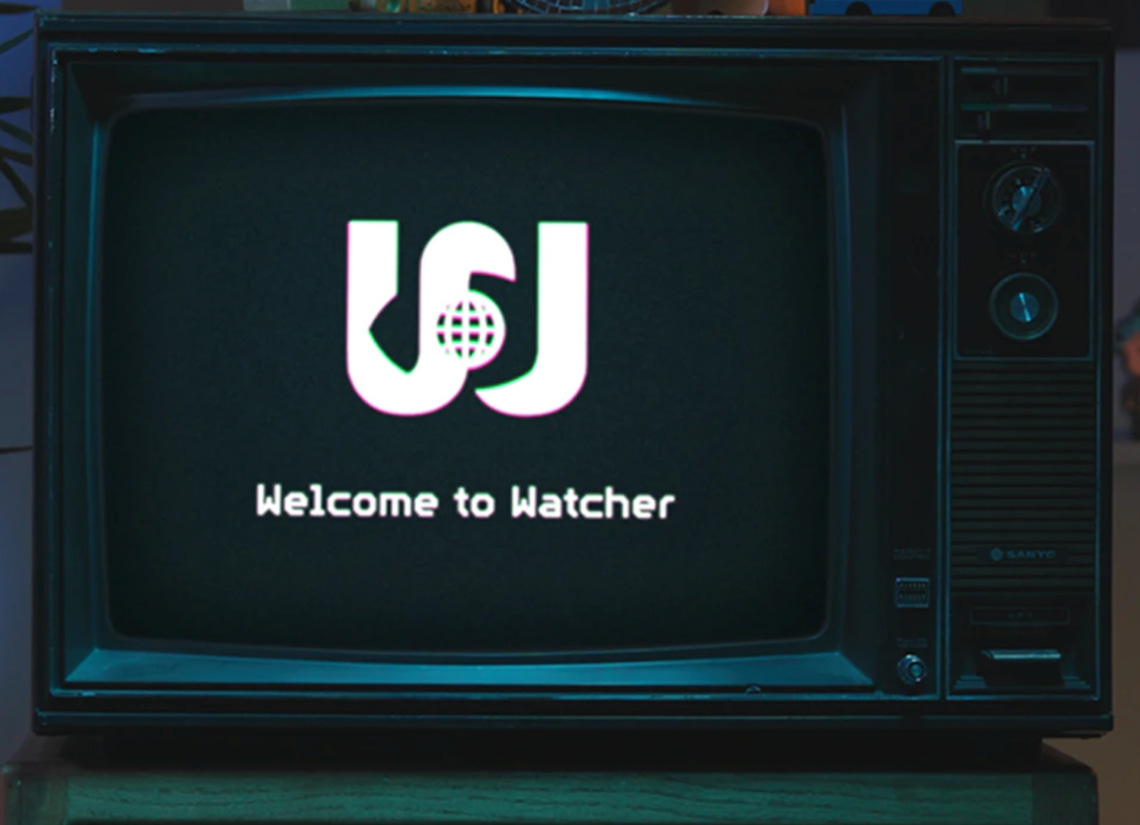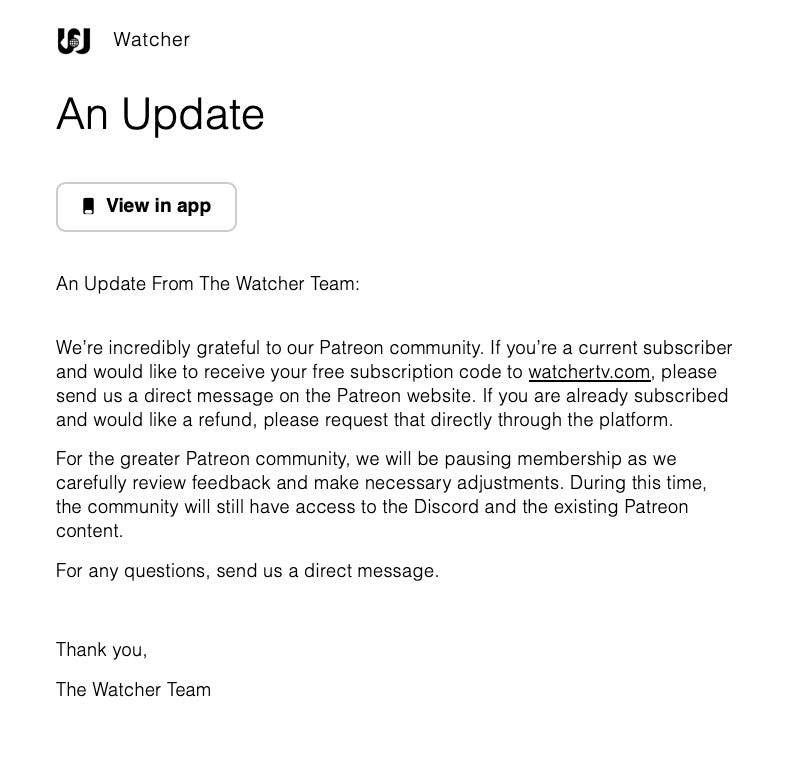Are you familiar with the YouTube channel, Watcher?
This channel is an evolution of Buzzfeed Unsolved, and features three former Buzzfeed employees, Steven Lim, Ryan Bergara and Shane Madej. They have built a large yet engaged following through series like Puppet History and Ghost Files.
Over the weekend, Watcher announced to its 2.86 million subscribers that from here on in, all new series created by the trio would be available exclusively on their platform, watchertv.com*. That is except for the first episode of each season, which will be released on the YouTube and sit amongst their back catalogues. As you might have imagined, the content will no longer be free, and now be available for $5.99 a month, or $59.99** annually. Their video Goodbye YouTube was released one day ago (at the time of writing) and is sitting at 1,378,412 views.
As you can imagine, fans aren’t happy. There are currently just over 66,000 comments on this video, and there is a theme of calling out the expectation that fans will be able to afford an extra streaming service, with responses like:
Even those who seem to support the decision from a business perspective, admit they won’t be paying for the service:
It also seems that the contextualising of the decision is out of line with their current content and audience expectations, as evidenced through comments such as these two:
Interestingly the comments switch between talking to the creators themselves and then talking to the other fans in the comments. Something very common seen in these comment sections. In some instances, the commenter might be commenting to someone they already know offline, or in another online space. Other examples may see commenters merely communicating via the shared platform and the commonality of watching the same video.
The ‘goodbye’ video itself is strange and laboured. There is an acknowledgment of a change in them as creatives, which one would expect. They rely on the fact that they were growing with YouTube, one of them even claiming they learnt how to ‘be an adult’ on the platform. Interestingly, whilst YouTube has evolved over time, it was always a platform which has monetised its product. By attempting to move their audience from one platform to another, it feels like Watcher is trying to carry sand in their hands across a beach, they may end up with some left, but they’re going to lose a lot (of members) in the process. Perhaps sand is too generous, perhaps we are dealing with water.
The fans themselves are aware of the irony of the situation given the state of the media now. Buzzfeed (where the channel and its hosts originally started) is frequently in the news due to layoffs.
Whilst the people behind Watcher haven’t done anything wrong; they create a very popular product and want to be the sole beneficiary of this. The comment section is incredibly astute when it comes to the strategy behind this decision, even if they don’t agree. This week, I was introduced to the concept of the ‘sarapocial relationship’ by Iza Jabłońska in Culture Vulture. The antonym of the often spoken about Parasocial relationship seeks to explain the perspective of the ‘famous’ half of this dynamic. The article imagines what it must be like to be on the other side of this relationship where ‘it is no longer 1 to 1, it is 1 to millions, at times.’ An interesting perspective to consider when making such a huge and risky decision such as that which Watcher have made. What Watcher may have done is completely misunderstood their value in comparison to that which YouTube brings.
In traditional forms of media, it’s quite common for a personality to move between mastheads, television stations etc. In some situations, you might see the audience follow. In others, the loyalty lies to the station itself more so than the person. By attempting to leave YouTube, even in part, the people behind Watcher seem to be biting the hand that feeds them so to speak, and that attitude and shift is simply too much for its audience. Further to this, Watcher already has a Patreon with 12, 572 members. When signing up you can choose to be The Watcher Society, Watcher Witnesses or Almighty Monitors, for $8.50, $16.50 or $40.50*** respectively. The names of these three groups is fascinating; the levels of power, dedication and access are obvious. Even if all their members are on the base level, my calculator tells me that they’re making over $100,000 a month (!) on this platform alone.
There is no real explanation of what this shift to a streaming service will look like for their Patreon members. Some of the YouTube comments accuse them of double dipping.
The team behind Watcher have announced to their paying subscribers their decision to move things to this streaming model. For the sake of this piece, I signed up for a month to understand how this portion of the audience feel about the decision. Before we get into that, check out the schedule for their upcoming content (or slate!):
The early access speaks to the video being available on YouTube. So, the content will be available on YouTube (the first episode of the season) or on their streaming platform. There is no mention of Patreon in this schedule. And the members have noticed. Some are questioning what the point is of being a Patreon member and the answers are commonly ‘no’. Whilst some are talking directly to the trio, other members are responding to each other. The main issue in the section is for those who have signed up for a year, only to find that’s essentially worthless with the introduction of the streaming service. Some acknowledge that their payment on Patreon has meant that the majority still get it for free on YouTube. Some voices in the Patreon comment section are congratulating them for knowing their worth. The new streaming service is cheaper than the base Patreon member price. But this seems irrelevant in these discussions. Many are happy for the three of them and have signed up to the new service as they want to continue receiving the content.
Ironically, the Patreon provides access to discord ‘to chat with us and each other!’, yet the comments are unanswered by anyone on the team. Further to this, the Patreon also claims that you can access brainstorms on Discord, ‘Help us come up with merch and content ideas!’ they exclaim. But depending on tone, it could be more of a plea. To mine the brains of fans for content seems an interesting move but I am not very familiar with the nuances of this relationship, both parasocial and socialpara.
There is an interesting dynamic at play for all content creators. Watcher feels that they are making ‘television-caliber, unscripted series just for you’ as stated by their Patreon, and with that many viewers it seems that a lot of people agree. Drawing parallels between YouTube and TV makes sense from an audience relationship and scheduling perspective. A YouTuber I watch recently went a week or two without posting a video and was responding to people’s disappointment about this likening it to when you turn the TV on and your show isn’t on. Yet, as audiences grow and content creators experience success, it makes sense for them to eschew platforms where the income stream doesn’t do what they need it to. But you can’t piss off people in the process.
Evolving audience expectations is really hard, similar to putting in boundaries with the people in your life, it is a lot of trial and error, and sometimes, people get offended. Putting things behind a paywall might seem like a good way to measure your value, but it’s also an attempt for people to commodify something we all thought we were benefitting off. It is a clear line in the sand between those who create and benefit (financially, creative fulfilment, commercial goods) and those who consume and benefit (emotional fulfilment, entertainment, and consumption of commercial goods). It will be interesting to see if any other creators make this move, and if it’s received in the same way, or if it has more to do with the context and managing of audience expectations.
As said by this user:
It is quite common for users to feel that content created by online creators no longer resonates. In fact, it is quite common for this to happen regardless of the medium. The difference is, the online dynamic encourages people to let everyone know that this is how they’re feeling. What we have here, is a creator breaking up with the audience (in a way), and we just don’t seem prepared.
UPDATE:
A few days after writing this piece, I received this notification from Patreon. Seems like they were seeing the comments after all…
* Thank you to my former students for sharing this news with me.
** I’m imagining this is USD but the website knows I’m in Australia…
*** This is definitely in AUD.












